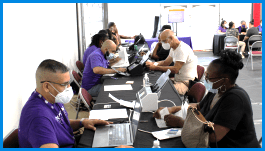Water affordability program helping Detroit residents maintain service, pay bills
February 8, 2024

AWWA Articles
Water affordability program helping Detroit residents maintain service, pay bills
A popular water affordability plan is helping thousands of struggling Detroit residents keep up with their water bills and avoid shutoffs.
The income-based Detroit Lifeline Plan, launched in August 2022, erases Detroit Water and Sewerage Department (DWSD) customers’ existing debt and reduces their water bills. Approximately 28,000 households are enrolled in the Lifeline Plan, which charges qualifying households as little as $18 a month for water bills that average around $80.
 “Human beings need access to clean, safe drinking water,” said Matthew Phillips, DWSD chief of staff and customer service officer. “The human body can only last three or four days without water, but beyond that, you still need to bathe. You need to cook. When your only tool is to interrupt services, no one wins. You’re potentially creating a completely separate problem; not just bad debt, but now you may be contributing to a health issue.” (Pictured right, DWSD staff sign up consumers for bill payment assistance program.)
“Human beings need access to clean, safe drinking water,” said Matthew Phillips, DWSD chief of staff and customer service officer. “The human body can only last three or four days without water, but beyond that, you still need to bathe. You need to cook. When your only tool is to interrupt services, no one wins. You’re potentially creating a completely separate problem; not just bad debt, but now you may be contributing to a health issue.” (Pictured right, DWSD staff sign up consumers for bill payment assistance program.)
The Lifeline Plan extended the reach and capabilities of the existing Great Lakes Water Authority’s Water Residential Assistance Program (WRAP), started in 2016 to provides customers with payment assistance and plumbing repairs for up to two years. Up to 4,000 Detroit households were enrolled in WRAP in any one year.
Phillips shared a story about a customer he recently enrolled in the affordability program. She makes $10,000 a year and lives with her 11-year-old son and senior citizen mother. They were using bottled water to cook and bathe because her water service was interrupted. Had she reached out to DWSD for assistance earlier or responded to their calls to act, her service would not have been interrupted.
In addition to enrolling her in the program, Phillips also connected her with additional assistance resources. She was invited to attend a DWSD Career Fair and promptly pre-interviewed for a position that would pay about $20 per hour, which would improve her ability to afford things beyond her water bill.
 “The benefit we realized is that we have customers who now have their dignity restored, knowing their service won’t be interrupted and they’re paying a portion of their bill every month,” said Phillips. “They’re contributing to their own success within their household.”
“The benefit we realized is that we have customers who now have their dignity restored, knowing their service won’t be interrupted and they’re paying a portion of their bill every month,” said Phillips. “They’re contributing to their own success within their household.”
The utility has also experienced a new relationship with community advocates, said Bryan Peckinpaugh, DWSD public affairs director.
“This shifted our whole relationship with community advocates,” he explained. “We’re now partners, making sure more households are enrolled in the Lifeline plan.”
In addition to receiving funding from WRAP, the Lifeline Plan receives federal money through the temporary Low-Income Household Water Affordability Program (LIHWAP). The American Water Works Association and other water sector associations are proponents of making that program permanent.
“Michigan Gov. Gretchen Whitmer allocated $35 million for 2024 to help fund a water affordability program, but what happens when that’s gone?” Phillips said.
There may be a solution in Detroit’s future as State Sen. Stephanie Chang is proposing a package of bills to create a statewide affordability program like the Lifeline Plan. This would sustain funding through a $2 per meter per month residential household fee. This legislation is expected to be considered this year.
In April 2023, AWWA partnered with the Association of Metropolitan Water Agencies (AMWA), the National Association of Clean Water Agencies (NACWA), the Water Environment Federation (WEF) and the National Association of Water Companies (NAWC) to release a joint report recommending that the U.S. Congress create an improved, permanent LIHWAP program into the federal safety net alongside energy and nutrition assistance.
Advertisement